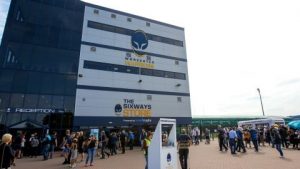Business activity contracts as firms look to exports for growth

BUSINESS activity contracted in the West Midlands during October although the drop was only marginal, latest data shows.
The latest Lloyds TSB West Midlands Business Activity Index – which measures the combined output of the region’s manufacturing and service sectors – posted 49.5, down from 52.1 in September. A figure below 50 is the signal for contraction.
Output fell in response to a decrease in the level of incoming new business. Backlogs of work fell, with the rate of decline quickening to the sharpest for more than three years.
A separate study suggests more Midlands entrepreneurs may be trying to overcome the lack of domestic opportunities by turning to export markets.
In its annual Entrepreneurship UK report – which coincides with the start of Export Week – Deloitte said over half of the businesses it surveyed in the region were already exporting or are making plans to do so.
The activity index showed employment continued to increase, although the rate of staff hiring was only slight and the weakest in 11 months. Input cost inflation accelerated to the highest since May, but output prices fell slightly.
October’s reduction in business activity was the first since June 2009. There was a divergence at the sector level, with manufacturers recording a marked decline in output but service providers signalling a strong rise.
Underlying the drop in activity was a fall in new business at West Midlands companies. The decline in new work was the first in three months, albeit only marginal overall. Anecdotal evidence suggested that fragile demand conditions had led to the decrease in new orders.
Outstanding business at West Midlands companies decreased further, with the latest fall the most marked for just over three years. Survey respondents commented that a lack of incoming new work had freed up resources to be dedicated to the clearance of backlogs.
The rate of input price inflation in the West Midlands private sector accelerated in October, reaching a five-month high. However, the increase in costs was weaker than that recorded across the UK overall.
Output prices decreased for a fifth successive month, although the latest reduction was only slight. Competitive pressures were generally reported by panellists to have weighed on pricing power.
Andy Youngman, area director for Lloyds TSB Commercial in Birmingham, said: “The West Midlands economy slipped into contraction in October, reflecting a fall in new work orders.
“The manufacturing sector fared considerably worse than their service sector counterparts, with backlogs of work decreasing at the fastest rate for over three years, and weakness in output looking set to continue unless inflows of new work pick up quickly.”
The Entrepreneurship UK report said 19% of the firms it had surveyed were targeting the emerging markets for growth, with a further 27% planning to follow in their footsteps.
Almost one third (32%) already export to traditional markets and an additional 12% are considering this option.
However, the advisory firm said entrepreneurs would need support to break into new markets with just 19% relying on banks as their primary source of development funding.









